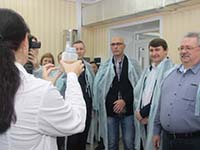Gaidar Readings were Held in Barnaul
On 11 November, the Gaidar Readings: Development of Regions and the Economic Policy in Present-Day Conditions were held in Barnaul.
The readings which were held at the Altai University were sponsored by the Gaidar Institute for Economic Policy, Yegor Gaidar Fund and the Government of the Altai Territory.




The readings where held by Sergei Prikhodko, Executive Director of the Gaidar Institute. The welcome address was delivered by Nikolai Chinyakov, Deputy Governor of the Altai Territory and Head of the Main Department of Economy and Investments of the Altai Territory and Sergei Zemlyukov, Rector of the Altai State University.
Within the frameworks of the Gaidar Readings, Alexei Vedev, Deputy Minister of Economic Development of the RF delivered a report: The Mid-Term Scenarios of Economic Development of the RF. According to the presentation materials, the inflation rate under the “base+” scenario will amount to 4.5% and 4.1% on the basis of the results of 2017 and 2019, respectively. As regards the target development scenario, the inflation rate in 2017 and 2019 is expected at the level of 4.3% and 3.9%, respectively. In 2017, “growth or growth of new quality” will be inherent to the Russian economy, said Alexei Vedev.
Speaking to journalists, the Deputy Minister said that the inflation rate in the RF in November may amount to 0.4%. According to the forecasts of the RF Ministry of Economic Development, on the basis of the results of the year the inflation rate may amount to 5.5%–5.8%. “December is a special month. It is a Pre-New Year trade. In fact, we are very optimistic. The most optimistic level is 5.5%, but I think it is likely to be 5.8%. Anyway, it is half as high than in the previous year”, Alexei Vedev said.
In his turn, in his report: Reformatting of Strategic Priorities of Social and Economic Development of the Altai Territory within the Frameworks of Development of the 2030 Strategy, Nikolai Chinyakov said that on the basis of the 2016 results the industrial production in the Altai Territory will grow 0.9% on the previous year. “This year the industrial output is expected to amount to 100.9% on 2015, while agricultural output, to 107.9%. Generally, gross regional product (GRP) will grow by 0.8%”, said N. Chinyakov.




The Deputy Governor pointed out that GRP of the Altai Territory is based on the two industries: agriculture and industry. Neither sector demonstrated reduction in the 2015-2016 period. It is to be noted that in the past decade individual lines of those sectors “grew at rates which were higher than nationwide ones”, for example, the food industry.
Also, reports were delivered by Sergei Drobyshevsky, Academic Director of the Gaidar Institute (Economic Growth Factors in the Russian Federation at the Current Stage and Economic Policy Challenges), Sergei Zemlyukov, Rector of the Altai State University (The Strategy of Development of Higher Educational Establishments in the Context of the 2030 Strategy) and Grigory Tomchin, President of the Fund for Support of Legislative Initiatives (Structural Restructuring Conditions).
Delivering his report: The Budget as an Instrument of Structural Reforms in the Economy, Ilya Sokolov, RANEPA Leading Researcher touched upon the main parameters of a three-year budget and also identified the main threats to the RF budget system.
According to Ilya Sokolov, revenues and expenditures in nominal terms lag behind GDP growth. But if the revenues demonstrate growth in nominal terms, decreasing in shares of GDP by 1 p.p. from 2016 till 2019, the expenditures both in nominal terms and as % of GDP fall dramatically by 18% in relation to GDP. Such parameters mean that there is a deviation from the active fiscal policy.
In the pattern of the expenditures, there is growth only in allocations on the social policy and state debt servicing. Without revision of the existing procedure for fulfilment of public obligations – the pattern of expenditures will inevitably get even worse – deviation from the strategy of development towards “adaptation to new budget rules” will be greater.
The 2017–2019 budget is far from being a development budget, but it cannot be regarded as the budget of long-term stabilization, either: an explicit tilt to unprecedented volumes of borrowings on the domestic market for funding current needs results in “eating away” of loans and shifting of problems related to repayment of debts to the future.




The dynamics of the federal budget expenditures in 2017–2019 show imbalances in distribution of funds, while the federal budget’s general parameters point sooner to its de facto one year nature.
Within the 2017-2019 budget consolidation, no target and gradual improvement in the ratio between “productive” expenditures and “non-productive” expenditures is planned. So, reduction of productive expenditures in nominal terms is planned on average at higher rates (6%, 4% and 8%) than that of nonproductive ones (9%, 2% and 1% in 2017, 2018 and 2019, respectively).
According to Ilya Sokolov, the budget is in conflict with the imperative demands of the time. The fiscal policy is a mirror of deep-rooted imbalances in the existing model of distribution of funds. Social obligations are to be revised and a budget maneuver is necessary.
Within the frameworks of the Gaidar Readings, lectures for students were delivered by: Grigory Tomchin, who spoke about management of networking between the authorities and business and Sergei Drobyshevsky who touched upon economic crises in Russia.
In the second part of the plenary session, reports were delivered by Аlexander Deryugin, Researcher of the Gaidar Institute’s Fiscal Policy Department (the report: Regions Financial Limitations Amid the Crisis); Natalia Schagaida, Director of the RANEPA Center for Agrarian and Food Policy (the report: The Russian Agriculture and Import Substitution Policy: Opportunities and Limitations); Vitaly Kopytov, General Director of OOO Altaiskie Melnitsy who spoke about implementation of export potential of the flour-and-cereals industry; Maksim Stepanov, representative of the Yug Sibiri Company who told about the current state and prospects of development of the vegetable oil and fat industry of the Siberian Federal District on the basis of the example of the Yug Sibiri Group of Companies; and Yevgeny Shvakov, Director of the International Institute of Management Economics and Information Systems of the Altai State University (the report: Formation and Implementation of Municipal Investment Strategies as a Factor of Upgrading of Investment Activities in the Region).
In his report, Alexander Deryugin touched upon the current implementation of consolidated budgets of regions and provided a forecast of equilibrium parameters of regional and local budgets in 2017–2019.
According to Alexander Deryugin, on the basis of the results of 10 months of 2016 the index of growth in revenues of regions amounted to 104.4%. The main contribution to growth in revenues was made by excises: they ensured 133.7% of growth.
Alexander Deryugin said that in 67 regions revenues of consolidated budgets of regions exceeded the respective level of the previous year. In 34 regions, growth in revenues of consolidated budgets exceeded the annual level of the consumer price index (106.1% against 107.5%). Simultaneously, in 60 regions expenditures of consolidated budgets of regions exceeded the respective level of the previous year (67 on the basis of the results of H1). In 25 regions, growth in expenditures of consolidated budgets exceeded the annual level of the rate of inflation (106.1% against 107.5%).
According to the presentation by Alexander Deryugin, for the first time since September 2012 a somewhat decrease in regions’ public debt was observed.
Within the frameworks of the Readings, Vladimir Pritupov, Deputy Governor of the Altai Territory took the floor. He also summed up the results of the debates.
Presentations to reports:
- A. Vedev. Mid-Term Economic Development Scenarios
- I. Sokolov. Budget as an Instrument of Structural Reforms in the Economy
- S. Zemlyukov. Strategy of Development of Higher Educational Establishments in the Context of the 2030 Strategy
- A. Deryugin. Financial Limitations of Regions Amid the Crisis
- N. Shagaida. The Russian Agriculture and the Import Substitution Policy: Opportunities and Limitations
- V. Kopytov. The Prospects of Exports of Flour by Grain-Processing Enterprises of the Altai Territory
- E. Shvakov. Formation and Implementation of Investment Strategies as a Factor of Upgrading Investment Activities in the Region
The Mass Media:
- The Altai Territory Receives the Gaidar Readings //The Club of Regions. The Federal Expert Network, 10.11.16.
- Industrial Output of the Altai Territory on the Basis of the 2016 Results will Grow 0.9% , Said Deputy Governor // Interfax–Russia, 11.11.16.
- The Inflation Rate in November May Amount to 0.4% - The RF Ministry of Economic Development // Finmarket, 11.11.16.
- RF Ministry of Economic Development Forecasts a 0.1%-0.3% GDP Growth in Q1 2017 // Interfax, 11.11.16.
- Deputy Head of the Ministry of Economic Development: in November the Rate of Inflation May Amount to 0.4%, while on the basis of the results of the year, to 5.8% // ТАSS, 11.11.16.
- The Gaidar Readings are held in the Altai Territory // Katun 24 TV Channel, 11.11.16.
Friday, 11.11.2016